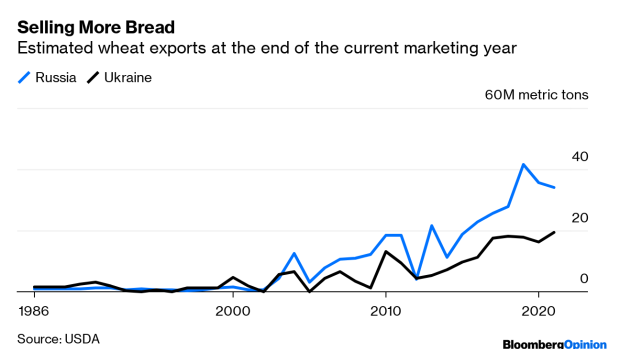Aug 15, 2019
Ukraine’s Economy Enjoys a Hopeful Moment
, Bloomberg News

(Bloomberg Opinion) -- Nobody expected Ukraine’s economy to grow as fast as it did in the second quarter. Though the growth was driven, in large part, by a bumper wheat harvest, the optimistic numbers can become a self-fulfilling prophecy as newly elected President Volodymyr Zelenskiy promises a new kind of politics and investment-friendly change.
Ukraine’s real gross domestic product increased by 4.6% year-on-year in April through June, way above the Bloomberg consensus forecast of 2.6%. It’s the fastest growth since the exceptional third quarter of 2016, when real GDP increased by 4.8%.
This quarter’s jump could be something of a fluke, too. Ukraine competes with Russia and, to a smaller degree, with Kazakhstan for the same wheat export markets. In recent years, Russia has been the undisputed leader, but in 2019, weather conditions have undermined the Russian harvest and boosted Ukraine’s wheat production just in time for the country to benefit from a shortage in Europe.
According to Ukraine’s official statistics agency, grain exports have increased 42.3% year-on-year in the first half of 2019. This could be a one-off lucky development, but there are more reasons for optimism. Trade balance data show Ukraine’s imports are growing faster than its exports, and the fastest growth is seen in consumer goods: For example, shoe imports are up 46.6%. Along with fast growth in retail sales (they were up 10.3% year-on-year in June), this indicates a healthy consumer demand.
One reason for this is the EU’s relative openness to Ukrainian migrant labor, which helps eliminate labor shortages in Poland and, increasingly, further West. Remittances from Ukrainian workers abroad are going through the roof.
According to official sentiment indices, Ukrainian business is growing more optimistic about the country’s prospects; the optimism levels are highest in the retail industry, but pessimism is subsiding elsewhere, too. Zelenskiy, whose Servant of the People party sealed the first one-party majority in Ukraine’s post-Soviet history last month, promises a departure from all previous governments’ corrupt, self-serving practices. Even if few in the Ukrainian business community believe he can end the war in eastern Ukraine, as a sizable chunk off his electorate expects him to do, less corruption and a more pro-investment stance are more realistic expectations.
Perhaps most importantly, Zelenskiy has promised to do something which all previous governments balked at: lift Ukraine’s moratorium on land sales by the end of this year. Given Ukraine’s agricultural specialization (the sector is responsible for 10% to 12% of the country’s economic output), this move – long advised by Ukraine’s biggest creditor, the International Monetary Fund – has the potential to boost growth to the levels long enjoyed by Ukraine’s western neighbors, Poland, Hungary and Slovakia. Zelenskiy has the political capital to make a free land market a reality; if he does nothing else, foreign investment in Ukraine will leap from the current abysmal level.
Ukraine, of course, is uniquely skilled at blowing its best opportunities. It faces large debt repayments this year and next, the trade deficit of $3.7 billion in the first half of this year looks threatening, and rule of law is still weak, scaring off investors. Besides, the next government – which Zelenskiy’s party is yet to create – will have to be careful to keep growth from leaping too high, otherwise it’ll set off enormous payments on warrants issued to debt holders in a desperate restructuring deal in 2015. The warrants are triggered in 2021 if Ukraine’s GDP is higher than $125.4 billion (it was already higher last year) and real GDP growth faster than by 3% a year. If these conditions are fulfilled, it owes a sizable share of the growth to the warrant holders.
But even despite these threats, this is an optimistic moment in Kyiv. Zelenskiy can enjoy the rays of his lucky star for a while longer before he plunges into the fray of rebuilding his dysfunctional country and turning it into an example for other post-Soviet states.
To contact the author of this story: Leonid Bershidsky at lbershidsky@bloomberg.net
To contact the editor responsible for this story: Therese Raphael at traphael4@bloomberg.net
This column does not necessarily reflect the opinion of the editorial board or Bloomberg LP and its owners.
Leonid Bershidsky is Bloomberg Opinion's Europe columnist. He was the founding editor of the Russian business daily Vedomosti and founded the opinion website Slon.ru.
©2019 Bloomberg L.P.


